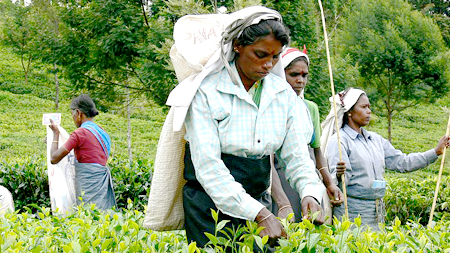
The concept of resident workers being tied to a minimum daily wage formula which has remained the bonded lifestyle of the plantation workers over the last 150 years of the industry would change for the better for the workers, with the profit share model now being introduced in some of the estates, by one of the Regional Management Companies (RPCs), the Kelani Valley Plantations PLC.
The company started about five months ago, to allot a minimum of one hectare of tea land to the workers, to cultivate on their own, with constant monitoring, guidance and provision of all necessary material, especially, fertilizer.
 The crops would be supplied to the estate management under very attractive purchasing terms, thereby enhancing their earnings twofold or more, in addition to their work on the estates on the daily wage formula. The program is initiated on an experimental and regular observation basis, in line with the government’s program of transforming the estates as plantation villages, and raising the status of the workers as plantation farmers. The land allocated is that which has failed to procure labour, due to laour shortage.
The crops would be supplied to the estate management under very attractive purchasing terms, thereby enhancing their earnings twofold or more, in addition to their work on the estates on the daily wage formula. The program is initiated on an experimental and regular observation basis, in line with the government’s program of transforming the estates as plantation villages, and raising the status of the workers as plantation farmers. The land allocated is that which has failed to procure labour, due to laour shortage.
The Sunday Observer visited Tillyrie Estate in Dickoya where some 100 hectares have already been allocated to the workers by the Kelani Valley Plantations, for an on-the-spot study and interview with some of the workers and also an interview with Company Director, Anura Wijekoon, Estate Manager, Lakshman Keragala and Assistant Manager, Lakshitha John.
Company Director Anura Wijekoon, answering some of our questions said, the workers who have contributed immensely to the industry over the last 150 years, are part and parcel of the industry.
Considering this and the acute labour shortage which resulted in the abandonment of some of the crop-bearing tea lands, the company decided to allot about one hectare of tea land each, to the workers to work on and provide the leaf to the estate under the very attractive ‘bought leaf’ formula, he said. The management, as required, will also provide 300 days work on the other tea lands of the estate, he explained.
This program, implemented in many of their estates, is mutually beneficial, and is a gradual observation and experimental process, he said. The estates will continue as before and only the fertile tea lands abandoned due to labour shortage are being given under the share profit model, he said. Many programs are being implemented for the socio-economic welfare of the workers, including housing projects, he said.
Tillyrie Estate Manager Kakshman Kergala said, sizable areas of the estates have been abandoned because of labour shortage and it may be possible to get over the problem by introducing the profit share model system.
Assistant Manager, Lakshitha John said, before the program of allotting lands to the workers was started, he brought in amounts ranging, Rs.500,000 to Rs.600,000 for disbursement as wages, but after the program was started, it has increased to more than Rs.2.5 million, which indicates an increase in their earnings.
The crop yield has also increased with the workers working 30 days a month in the tea lands allocated to them, he said. The entire family is engaged, andare working less hours at their discretion, unlike under the daily wage system, and their income has multiplied as all abandoned tea lands have now become crop yielding lands, Laksitha said.
The members of the workers’ family who went away seeking greener pasture are now returning to the estate, he said.
The Sunday Observer spoke to some of the workers who have been allocated the land, who expressed mixed views .
Kamaladevi of Tillyrie Upper Division: “ I have three children attending school. My husband has been working outside the estate. Now we are working on the block of tea land given to us. With our experience, we are maintaining the land properly and get good crop yields. We are happy and our income has increased”.
Kesavan Indira of Tillyrie Upper Division, expressed the same views as Kamaladevi and said, her six children are attending school and they did not have any financial constrains now.
 Subramaniam Ranjan , CWC Estate Committee leader on Tillyrie Upper
Subramaniam Ranjan , CWC Estate Committee leader on Tillyrie Upper
Division: “ My family is working on the land given to us and our income has increased. But we have not been given any documents to prove that the particular land block has been given to us. We also face threats from leopards and hornets and need security. The other problem is, the estate management is not registering new workers”.
Perumal Amarawathy of Tillyrie Estate: “ Although my family was given a block of land we did not take it because our Union leaders want us to get an agreement from the management to ensure that this land will become our property after some time, and will not be taken back”.
K.Vasantha: “I am a widow with three children, schooling. I also want the management to sign an agreement as requested by Amarawathy. I would like to work as before under the daily wage basis because I do not like to work in an isolated area, alone”.
Murugan Kanchanadevi : “We are working in the land given to us and are very happy because our income has increased threefold.
My four children attend school and we are able to meet their expenses without any difficulty”.
Sivasamy Chandrakumary: Expressed the same views as Murugan Kanchanadevi.
S.Agila : “ We have been asked to work in the block of land only for three months. We would appreciate if a written document could be issued stating that the land has been given to us”.
Rajendran Visalatchy: “We are working on the block of land given to us. Under the wage system we get half-a-day’s pay on most days because we cannot pluck tea leaves according to the specified norm of 18 kg.
So we get only a meagre monthly remuneration. But, working in the block of tea land we get a good income and do not have to be there during specific hours. We like it”.
Subramaniam Vasanthy , Estate Women’s Committee Leader, Tillyrie Estate: “We want a document or some agreement from the estate management to prove that the particular plot of land has been allocated to us.
Unless that is done we cannot go and work in the plot earmarked to be given to us”.
